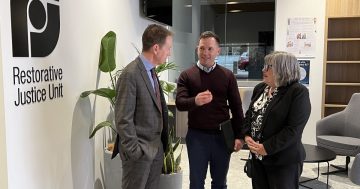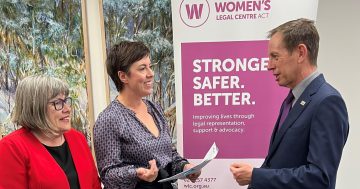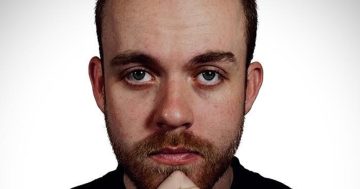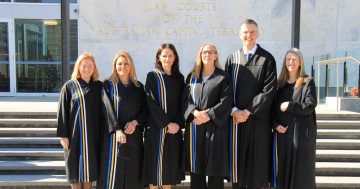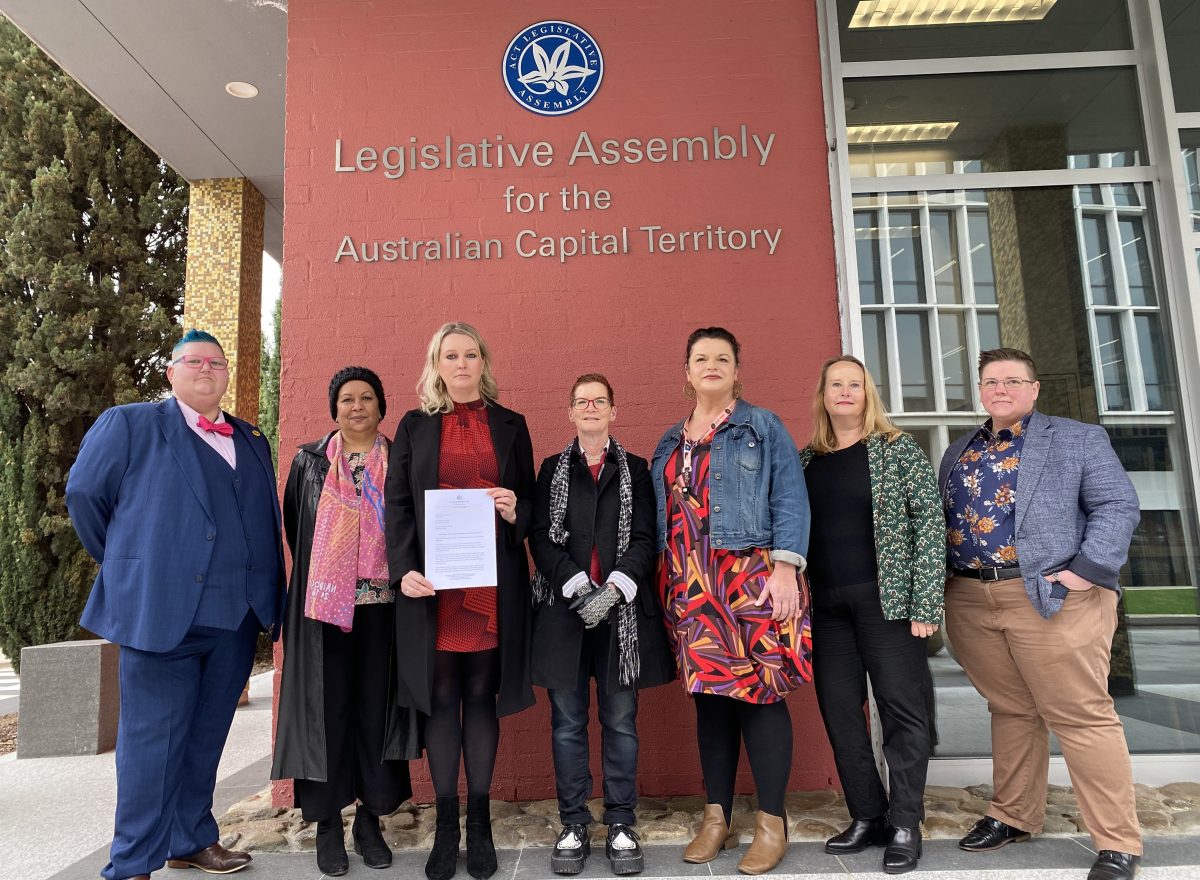
Advocates calling for a specialised sexual offences court in the ACT include DVCS CEO Sue Webeck, ATSIEB deputy chairperson Paula McGrady, MLA Dr Marisa Paterson, CRCC CEO Chrystina Stanford, Nguru Outreach Facilitator Cecilia McKenzie, YWCA CEO Francis Crimmins and A Gender Agenda Executive Director Dr Vik Fraser. Photo: Claire Fenwicke.
“I am a survivor of family and sexual violence, but I am a victim of the criminal justice system.”
That’s one experience of a victim of sexual offences trying to navigate the court system – and advocates don’t want anyone else to be “re-traumatised” while trying to receive justice.
Murrumbidgee MLA Dr Marisa Paterson was joined by representatives from several sexual violence support services to call on the ACT Government to establish a specialist sexual offences court.
She’s written an open letter to the Chief Minister, Deputy Chief Minister and Attorney-General calling for the “urgent” implementation of the service.
“A specialist court is not the sole answer to addressing this violence in our community – for that, there needs to be a whole-of-community education driving cultural and attitudinal change,” Dr Paterson said.
“However, for those victims that do seek to pursue justice through the criminal system, we need to provide a system that does not exacerbate trauma.”
Issues with the ACT’s criminal justice system in relation to sexual offences have been highlighted repeatedly in recent years, through the Listen. Take Action to Prevent, Believe and Heal report from 2021 and more recently in the Sofronoff Report from the Board of Inquiry into the ACT’s criminal justice agencies.
Dr Paterson acknowledged work has been underway to improve the experience of victim-survivors when accessing the court system, but said the Territory needed to go further.
“This is not something we want to see a ‘yes’ or ‘no’ to instantly, this is something that we really want to see work put towards to determine whether this is appropriate in this jurisdiction and what we can do to achieve reform,” she said.
“We need to continue to push for further reform, the status quo is not sufficient … we need to be brave, we need to go further, we need to do better in the ACT.”
It’s been highlighted that there were more than 500 reports of sexual offences to police in the 2021-22 reporting period, with very few getting to court.
Those that do only have a 7 per cent conviction rate.
It’s unclear what the specialist sexual offences court would entail, but it’s been suggested to only have judges and legal practitioners specially trained in the dynamics of sexual violence, an understanding of appropriately questioning ‘vulnerable witnesses’, and an expedited court hearings list to ensure people don’t have their cases drag on in the legal system for years.
The model is already in place in New Zealand and South Africa, and Scotland is preparing to progress with its specialised sexual offences court in the near future.
Canberra Rape Crisis Centre CEO Chrystina Stanford said we only needed to look at recent cases of alleged sexual violence to see much more needed to be done in this space.
“Sexual assault is a really serious crime, it’s not a crime that’s disappearing from our community … with all of the reports to police, there are many, many other people who are never able to seek help or sometimes spending a lifetime seeking help,” she said.
“Sexual assault is a crime like no other that’s responded to in the community – we don’t respond to anything else in the same way that we do this issue – and that says to me there’s a significant difference and also a really big problem.”
While Domestic Violence Crisis Centre CEO Sue Webeck said those who experienced sexual violence needed “choice and control” in the way they chose to engage in any system – be it one that provides care, support or criminal justice.
“We know that the criminal justice system is not working for the majority of people, it stops them reporting at the start,” she said.
“One [victim-survivor] said very clearly to me: ‘I am a survivor of family and sexual violence, but I am a victim of the criminal justice system.’
“We need to find ways to actually action what we’ve heard from numerous reports from numerous years, and this is a tangible call to action [which] could change the response to those who are unable to come forward at this point to seek support, care and justice in our system.”
Attorney-General Shane Rattenbury acknowledged a specialised sexual offences court had been a recommendation of the 2021 report, and said consultation on this model had begun.
“The government has been talking with the courts – they’ve come back with some initial feedback, and we now need to take that and consult more widely to think about both that feedback and the model for the ACT,” he said.
Mr Rattenbury said questions had been raised over whether the Territory was large enough to accommodate such a court, or if other avenues were more appropriate.
“[Such as] more training for judges, better insights into how to work with victim-survivors to ensure the process is safe for them when they appear before the courts,” he said.
Sexual violence support services that have supported this call for a specialist court include the Canberra Rape Crisis Centre, Domestic Violence Crisis Centre, A Gender Agenda, YWCA, the ACT Aboriginal and Torres Strait Islander Elected Body and Women with Disabilities ACT.













